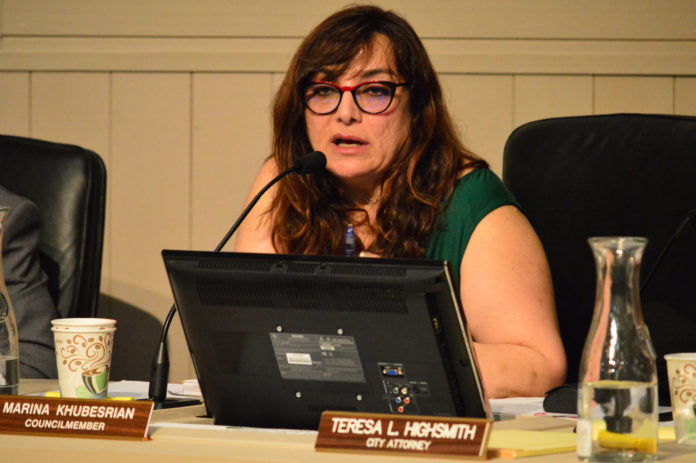Resignations from the South Pasadena City Council are rare.
When Dr. Marina Khubesrian submitted hers Saturday, not only was she the first woman to do so but, it appears from research of the records, the first to do so since the 1950s.
Even so, she is at least the 13th person — including six mayors — to resign from the Council since the city’s founding in 1888, thanks especially to a paroxysm of resignations that took place between 1906 and 1916 that were occasioned by class warfare, career advancement, conflicts of interest, sickness and just plain moving out of town. Khubesrian’s resignation also appears to be first submitted due to an ethics violation.
Prior to this week, the most recent resignations appear to have been those of Clarence Stanyer and Paul McKelvey. Stanyer resigned Aug. 20, 1959, the result of having suffered a heart attack nearly a year earlier. McKelvey, who in addition to his four years on the board chaired the Community Chest, served on the Planning Commission, the YMCA board and many other church and civic committees, submitted his resignation in August of 1953, having decided to move to Pasadena’s Chapman Woods neighborhood.
Less banal was the resignation letter Philip F. Dodson sent on July 25 1927 to his colleagues on what was then known as the Board of Trustees, saying he anticipated his name would be in contention for an office at the upcoming state Convention of the American Legion in Santa Barbara. The Legion’s constitution, he explained, “provides that a holder of an elective, salaried public office is not eligible” to stand for a Legion office. “The people will therefore understand that this resignation is not due to any differences between the members of the Board, or a desire to avoid any responsibilities.”
Dodson was successful in Santa Barbara. He became Commander of the Legion’s California Department, served as one of the state’s 41 delegates to the Ninth National Convention of the American Legion held that year in Paris, France and was on the Legion’s national executive committee during 1928-30.
Dodson was President, or what we now call Mayor, of the board at the time of his resignation. He had been a trustee since 1920. An attorney, Dodson also went on to serve as a delegate to the 1936 Democratic convention and the following year was later named an assistant US attorney general.
A decade earlier, there’d been a slew of resignations signaling the end of the two-year reign of what the Los Angeles Times called South Pasadena’s “’famed ‘Millionaire City Council.’” Its leader, President Warren N. Carter, was a wealthy financier and the retired president of the American Laundry Machine Company. He was elected President after the resignation of President Ernest V. Sutton, who quit the board on Dec. 27, 1915 citing an increase in the extent of his private business interests.
In early 1916, Carter gave a newspaper interview condemning one of his board colleagues, Gilbert F. Trask–who Carter had appointed to replace Sutton–as belonging to “a class of South Pasadenans who are against all improvements.”
Trask accused Warren of attempting to pack the Board with his cronies. The dispute, according to the Times’ local correspondent “brought to a head the rumors which have been circulating in this city for many months to the effect that all the important matters of public business are settled in a locked ante-room and that the necessary public meetings are but a rehash of these alleged secret pow-wows.”
Trask was opposed to the secret meetings and, only three weeks after being appointed, resigned because of them. A new faction was forming to select candidates for the April 10, 1916 election who, the Times’ correspondent reported, would be “pledged to clip the wings of Warren F. Carter, alleged ‘Boss,’ and to transact all city matters publicly.”
It worked. Trask and two members of his “Citizens’ Party,” Jonathan S. Dodge and E. T. Grua, were elected by a large majority over Carter’s allies, taking the board majority. Carter and his remaining ally, Don E. Gates, a lumber magnate with extensive cattle holdings in California, submitted a joint letter of resignation. “In our private business we have been accustomed to doing things,” they wrote. “A careful study of the results of yesterday’s election indicates a desire on the part of the people of South Pasadena to call a halt in the program which we have been engaged in carrying through. We have no desire, nor do we feel it is our duty to continue on the Board of Trustees when there are no real things in prospect to be done.”
The year 1909 was also marked by multiple board resignations. In January, President R.W. Pridham resigned after being elected Los Angeles County Supervisor. In March, W. F. Axtman, a real estate editor for the Los Angeles Express, resigned after purchasing an interest in the South Pasadena Record, because it printed the city’s legal ads. In April, Charles N Taylor, who became President of the board after Pridham was elected supervisor, surprised the trustees by telling them he was resigning because he had purchased a ranch in Artesia and was taking his family there in two weeks. Then in July, Leonard Hargrave announced he would resign because he was moving his family to a dairy ranch he owned in Chino.
The first person to resign from the Board of Trustees was Joseph B. Soper, who submitted his resignation May 28, 1906. One of South Pasadena’s earliest residents, Soper, a bank and school board trustee, was also one of the founders of the South Pasadena Masonic Lodge. Some weeks earlier, Soper had contracted a severe cold and in the days before he filed his resignation his condition, according to the LA Times, “had become so alarming that physicians have little hope of his recovery.”
Special thanks to South Pasadena historical librarian Olivia Radbill.















.png)







